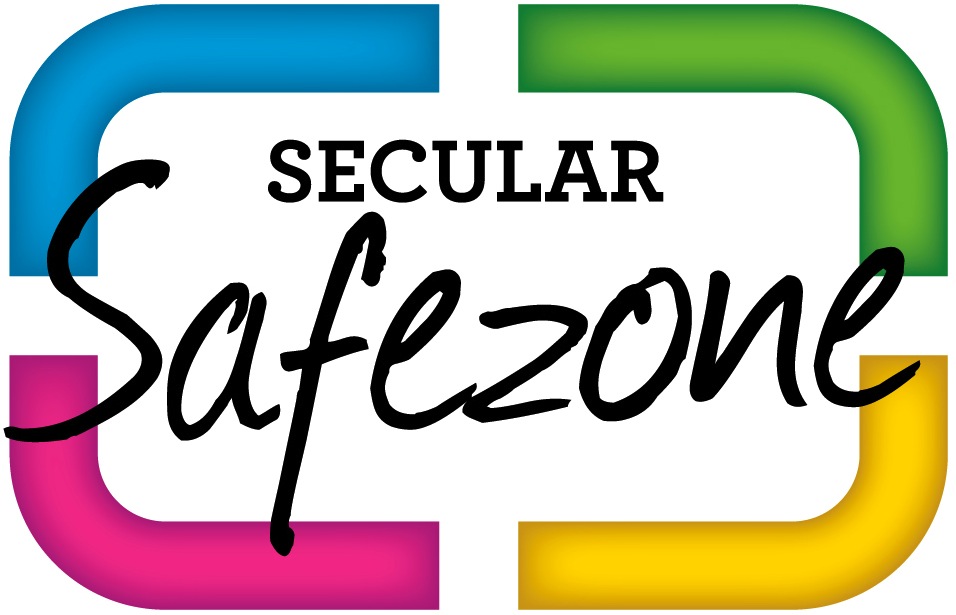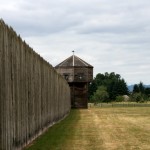My friend Jesse Galef, the communications director at the Secular Students Alliance, sat down with me to do a Q&A about a new project they unveiled: the Secular Safe Zone. The program recruits and trains teachers, students, and other allies to establish clear safe points for non-religious students to have conversations and ask questions. Here’s the discussion we had:
Jesse, can you tell me and the readers a bit about why the Secular Students Alliance has started the Secular Safe Zone project?
Sure! We at the Secular Student Alliance hear far too many stories of secular students being bullied, harassed, and stigmatized – and they don’t know who to turn to for help. Sometimes it’s an offhand comment about atheists being unwelcome in America, sometimes it’s vandalism, and sometimes it’s threats of physical violence. The vast majority of the mistreatment comes from misconceptions about atheists, but the prejudice is so widespread that students can’t even count on their teachers, friends, or even their family to understand them. For a student to feel isolated to that extent can be crippling.
The Secular Safe Zone trains willing role models in student communities to make their environment a safe place for secular or questioning students. They can identify and stand up to anti-atheist bullying and let students know that they have an ally. Just knowing that they’re not alone – that someone will stand up for them – can mean the world to a student.
Why is ‘secular’ in the phrase about making “safe spaces in which secular students can question, criticize, and discuss topics and issues important to them” at all? If you drop it, it sounds like you’re just describing the basic function of a school.
Good question, and it brings to mind an exchange in Season 2 of The West Wing:
TOBY: But I’ll tell you why it should be front and center. It’s not the first amendment, it’s not religious freedom, it’s not church and state, it’s not… abstract…
LEO: What is it?
TOBY: It’s the fourth grader who gets his ass kicked at recess ’cause he sat out the voluntary prayer in homeroom. It’s another way of making kids different from other kids when they’re required by law to be there. That’s why you want it front and center; fourth grader; that’s the prize.
Schools have a responsibility to create welcoming educational environments for all their students regardless of non-educational traits like gender, ethnicity, sexual orientation, or yes, religion. Conversations about controversial and important issues should absolutely happen, the question is how and when.
The bullying many secular students (students for whom religion isn’t a part of their life) currently face is pervasive and personal – it bleeds into the educational environment and often takes the form of personal attacks rather than collaborative exploration of ideas. That’s what sets the Secular Safe Zone apart: the anti-atheist discrimination is out of hand, and it’s often school-sanctioned.
Is this a project just for atheists? I’ve seen plenty of LGBT safe zone stickers up in the classrooms of non-queer teachers. What would it mean for a religious teacher to put one up?
The Secular Safe Zone is not just for atheists! You’re exactly right; just like non-queer teachers can be LGBT allies, religious mentors can be Secular Safe Zone allies.
Teachers, guidance counselors, resident advisors, chaplains, boy scout leaders… anyone who works with students and thinks that conversation around religious doubts should be respectful is encouraged to sign up and take the training.
What kind of ‘safety’ do these stickers promise? If I put a sticker like this up on my blog, on the grounds that I mean for the discussions to be unsafe for everyone (“that which can be destroyed by the truth should be”) would I be missing the spirit of the program?
My first impression is that it’s about 1) the voluntary nature of the discussion – can you “walk away” when it’s reasonable, without giving up an education/other goal and 2) the manner of the disagreement. I’ve heard the slogan that people should be treated with respect but ideas shouldn’t. That’s a good start.
Any other groups you think are in particular need of a demarcated ‘Safe Zone?’
I don’t know that I’m qualified to answer that. Since we work with nontheistic students, I tend to hear the stories about how society discriminates against them. I put a… perhaps 65% chance on someone mentioning a group and me slapping my forehead and saying, “Oh, of course!”
— — —
I appreciate getting the chance to talk through the program with Jesse. Growing up on Long Island, the vast majority of my classmates were atheists, as far as I knew, so it did feel like the whole school was a pretty safe zone to be secular in. However, when I talked about being an atheist in middle school, I had a couple of my classmates furtively seek me out to tell me they were too, and I was perplexed that they’d felt like they had no outlet before then. So I’d expect some students to benefit from this, even when you assume there’s not a cause for discomfort at baseline.
However, I feel a little odd about branding the safe spaces for deep discussion as explicitly secular. It makes sense that they’re secular in the sense of no-affiliation-with-a-particular-religion/philosophy-presumed. But it’s a bit odder if they’re secular in the sense that relying on religious first principles is gauche in these discussions. It would be strange to be comfortable saying “But I think that’s wrong because you can’t will it as a universal law” and not “But I think that’s wrong because it would distance you from Christ.” I don’t think the SSA is pushing this kind of secularism, but I think it would be easy for students or even teachers to have the wrong impression.













